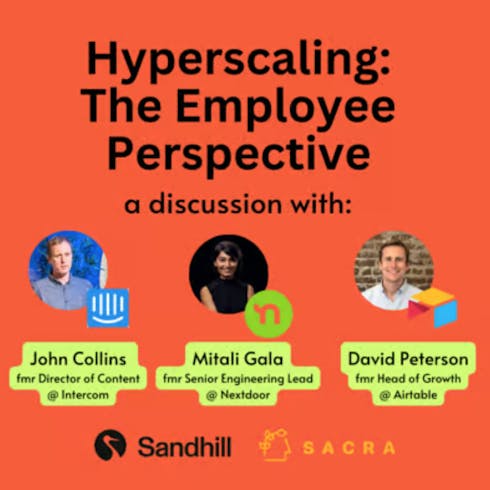Karim Atiyeh, co-founder and CTO of Ramp, on the future of the card issuing market
 Nan Wang
Nan Wang

Background
Karim Atiyeh is the co-founder/CTO of Ramp, the corporate card that helps finance teams better manage their spend and lower expenses. We spoke with Karim as part of our research into banking-as-a-service platforms and issuer processors in particular—Ramp is one of the fastest-growing fintech companies built on BaaS, with virtual cards powering their corporate card GTM on the front-end and their automatic expense categorization on the back-end.
Questions
- Could you please talk about how card issuing platforms created this opportunity for you to build Ramp?
- Could you please talk about use cases for customers where card issuing via Ramp really shines?
- Providing corporate cards is only the first step for Ramp. What leverage do you get from card issuing, as you build out the financial operating system?
- Expense management companies like Expensify and bill.com are now getting to card issuing as well. How do you think of Ramp's competitive advantage versus these players’ own cards?
- If we just dig into issuing processing a little bit, could you please talk about the process of picking a partner, when you are looking for card-issuing platforms, and what was important for you?
- You mentioned speed to market and scalability as two top-of-mind drivers when selecting partners. For these new generation issuer processors, the likes of Lithic, Bond and Unit, would you say speed to market is significant enough to differentiate them?
- In terms of scalability, how scalable are these issuer processor platforms?
- In terms of use cases, do you see, at one point, supporting more use cases will actually become a constraint for the platform to scale?
- If we look at the landscape today, what would you look for in a card issuing partner, considering Unit, Lithic, Bond, in addition to the first generation card issuers, such as Marqeta and Galileo?
- How do you see these card issuer platforms differentiate and position with their roadmap?
- Would love to hear your thoughts on the dynamics between the consumer-facing FinTech and the processing platform over time. How that dynamic might affect the interchange split?
- Last question. Could you please talk about the long-term option of taking card issuing in-house?
Interview
Could you please talk about how card issuing platforms created this opportunity for you to build Ramp?
Karim: If we go back a couple of years, the only way to be able to issue a card, essentially, was to be a bank yourself. If you're a chartered bank, you generally have a much easier time building a relationship with a card network and becoming a member of a card network, which allows you to start issuing cards on that network. But then you still have a pretty heavy lift, to be able build the technology and the connections with the network, that enable you to issue a card.
So, in the past, most banks that needed to issue a card would typically work with a company like TSYS or i2c. Although i2c is slightly more modern. I wouldn't consider companies like TSYS and First Data pure technology companies. They were a blend of services and technology, and then they'll come with their own hardware.
So you essentially were a bank. And then you would hire this managed service company, which included some components of technology and a lot of people. And, you would build this card program, but a lot of it was outsourced. As a result, it took a lot of time and it took a lot of money. So it was very hard for startups to be able to do this.
Fast forward to today, a lot of what I would call modern issuers, like Marqeta, Stripe and Galileo, have made that process a lot easier. So they've abstracted away the need to build the relationship with the network through a bank, and make that very accessible to startups. And they've also, in a way, replaced managed services with more robust APIs, with variable cost pricing. So it allows you to get up and running a lot quicker than what it used to take, with a much smaller upfront investment of both money and time.
Could you please talk about use cases for customers where card issuing via Ramp really shines?
Karim: Part of what we take a lot of pride in at Ramp is that we've differentiated ourselves by building a smart automation layer on top of your card. Many companies will just offer a card and focus on points and rewards. Instead, we decided to focus a lot of our resources on making these cards a lot more powerful.
For example, if you're running a company and would like to give your employees a wellness card or give them cards that only work for gas, you're able to do that very easily with Ramp. You can do it in one click for a virtual card. You can do it in one click for a physical card. You can even customize that card, so that it only works on certain days and certain hours and things like that.
On top of that, I think where we've really added a lot of value for our customers is in helping them close their books much faster. In the past, with older card providers, you had one system of record for all your receipts and you had a system of record for your transactions. Generally, the process of closing the books at the end of the month involved a lot of manual work, to tie these two together, and figure out what the transaction was for.
At Ramp, we've built technology that automatically matches receipts to the right transactions. You can send them via SMS. You can send them via email. And we do all the work to figure out which receipt matches this transaction. Ramp even suggests the correct accounting mapping to help you close your books a lot faster, as a result.
So, by the end of the month, when your finance team is looking at what happened, they not only know what expenses were incurred, but they have the receipts attached to them, and they know why these expenses were incurred. That's been a huge benefit to our customers. It enables them to make the right decisions with their businesses because they know where the money is going. They know when it's coming in. They know why it's being spent. As a result, it makes them a lot smarter about their businesses.
Providing corporate cards is only the first step for Ramp. What leverage do you get from card issuing, as you build out the financial operating system?
Karim: What we care about is that the companies that use Ramp are able to focus their most valuable resources on achieving their own mission and focus on the most important things for their business. That means not wasting time on figuring out what should be on a card, or how much money was spent last month on Facebook ads versus Google ads, and whether it was within budget or not.
And the only way that you can do that is to actually bring visibility into all types of spend, not just corporate cards. The reason we started with corporate cards is that we think that's the largest pain point.
A lot of the early stage companies use corporate cards for nearly everything. But as businesses mature, you start being more sophisticated about your finances, you generally start to think about ways that you could get financing from your vendors in certain cases, or certain vendors only accept ACH for larger payments.
As a result, we are as a company going deeper into the other forms of payment, including ACH bank payments, and many more to come. I think that allows us to both obtain and give back to our customers a fuller picture of their finances so that they can be smarter about all their money and not just their corporate card spend.
Expense management companies like Expensify and bill.com are now getting to card issuing as well. How do you think of Ramp's competitive advantage versus these players’ own cards?
Karim: It's similar to our competitive advantage versus the pure card players. Ramp has been winning, not because it's one of many corporate cards, nor because it's the only one that's also doing expense management. We have been winning in the market because we squarely focus on delivering a premium user experience, and on the speed that it allows the finance teams to move at.
I think that the quality of the product, the design, the speed at which we share features is our primary competitive advantage, and the one that we're betting on.
Let's use bill pay as an example. So businesses at scale don't really care whether they spend $200,000 on a Salesforce contract, and pay for it via card, or via ACH, or via wire, or via check. What they care about is whether they paid the right amount, or if they could have gotten a better deal, whether they picked the right product, and whether there was a better way to finance that payment.
At the end of the day, we will continue to evolve our product based on what solves the pains of our customers, without spending a lot of time thinking about what some larger competitors are doing.
If we just dig into issuing processing a little bit, could you please talk about the process of picking a partner, when you are looking for card-issuing platforms, and what was important for you?
Karim: There are many card issuing platforms out there. You have some of the older ones, like TSYS and First Data. They're battle-tested. They offer managed services in many cases. And a lot of the big banks use them. Maybe i2c is a slightly more modern, but I would probably bucket it in that same category of battle-tested. They've all been there for a while. They work, but a lot of the interactions require older types of integrations. And they don't have a clean API, for example.
Then you have some of the newer players, like Marqeta, Galileo, Synapse, Lithic and Stripe. A major benefit of the newer players is they tend to have much better documentation, cleaner, more modern APIs, that are more familiar to your modern developer and enable a faster speed of iteration when you're getting started in building the product.
So I suspect that for a small issuing company that's getting started, it'll be a lot faster to get off the ground if you're picking any one of the modern players.
The second consideration is what use cases do they support. And they're all very different. Some issuers allow you to issue on Visa, others on MasterCard. Depending on your use case, you may want to be on one network versus the other. Some allow you to issue prepaid cards, others don't. Some allow you to respond to the needs of businesses better. Others are focused on issuing consumer cards.
And, in some cases, some of these platforms have the ability to allow you to create bank accounts or virtual bank accounts. You have to figure out what you're trying to solve with your own use case and pick one of the players that satisfies that.
The third one that I think is the most interesting, and it was very important to us at Ramp is their product roadmaps, values, and the speed at which our partner moves. We have very ambitious goals at Ramp. And that generally has been a very important factor in how we pick our vendors and partners. We want partners who are equally as ambitious, and who are there to support us in the long run.
And when you're looking at vendors through that lens, it becomes more important what the roadmap is, and how fast they're able to move than exactly what the current snapshot of their features is. Because most of the value that you're going to be creating for that partnership is going to come over the next five or 10 years. It can be a pretty significant investment to integrate with any of these card issuing platforms. So, ideally, you don't want to be doing it very often.
You mentioned speed to market and scalability as two top-of-mind drivers when selecting partners. For these new generation issuer processors, the likes of Lithic, Bond and Unit, would you say speed to market is significant enough to differentiate them?
Karim: It's hard to say exactly, but I would say yes. The speed to market is not the biggest differentiator between these players. Although I do think that some players, by the virtue of being smaller, have some advantages, in that if you're a small team, a small startup, and you're just getting started, you’re just a bunch of engineers and product people, then it can sometimes be a lot faster to work with one of these smaller players. Because you're working with the engineering team very closely, and you're working with the core engineers that are building the product that you're using.
With some of the larger players, I'll use Marqeta and Galileo as an example, it may not be as fast for a small team, because you're not working directly with the engineers. But you have other advantages, like the support of essentially project managers. And, on the operational side, I would say, these players are probably stronger. Because when you're running the card program, you're not just building the technical integration. You're also having to figure out how I'm going to manage your relationship with the bank, which cards I'm going to manufacture, how long is it going to take to manufacture the card?
That experience that some of the more established players have is very valuable, in that case. So it really depends on what speed you're talking about. Do you want a speed to get to this super innovative new product? Or do you care about the speed of all the other operational things that come with it? And I think that's probably an interesting way to differentiate some of the new players as well.
In terms of scalability, how scalable are these issuer processor platforms?
Karim: There's two ways to look at scalability, right? There's the technical scalability of the platform—if I have tons of users, will I break? And then there's the business model scalability as well—if I scale a lot, does it still make sense from a monetary perspective?
Obviously, the bigger players have a lot more leverage when it comes to business model scalability and technical scalability, for many reasons. One is they're usually better capitalized, so they can, at scale, give you a much better deal. They also probably have better partnerships and better cost models with their own suppliers. And, on the technical side, they have the benefits of just having been in markets for longer, and having supported larger players as well.
We're talking in the abstract, but as an example, Marqeta is already a public company. So a lot of that information is public. You can see that they support the likes of Square. Square has scaled massively. And Marqeta is supporting them very successfully. So, if you're a small startup, I wouldn't worry about is Marqeta going to scale with me?
Some of the small players, frankly, I haven't used. I think it ends up being more of a leap of faith. But, generally, I've been very, very impressed by the talented teams over there. I could talk specifically about the team at Lithic because I've spent a fair bit of time with them. I have a very, very high degree of confidence that they can support the technical scale extremely well as a result.
In terms of use cases, do you see, at one point, supporting more use cases will actually become a constraint for the platform to scale?
Karim: So are you asking if the number of use cases can be a constraint to scale? So if you're a card issuer that only supports one use case? I'm not sure about that. I think it really depends on where you see the world going.
I think part of the reason there are so many issuing platforms is because the way cards have been issued recently has been very different than historically.
But I think Ramp is the exception in terms of the type of customer that these platforms have. Because Ramp supports many different types of businesses. Ideally, we want to support them with very different use cases.
I think the more interesting or common use cases that you see for these card issuing platforms tend to be very, very narrow or specific, right? It'd be like your gaming platform wanting to issue cards for its users, or a basketball team wanting to issue cards for its fans, or an influencer on Instagram wanting to issue cards.
In our case, yes, the breadth of the platform and the different use cases that it supports is an important one, because we are thinking about the full financial stack for our customers, and how we can better support that. But when you have a very different business model, where your primary business model is being a basketball team, and issuing a card is done for strategic reasons, then it doesn't matter as much.
I think how well the card issuing platform is able to support your specific use case is probably a bigger factor than how many different use cases they support. So it depends on the type of customer that you are. But I would argue that customers like Ramp are generally the minority.
If we look at the landscape today, what would you look for in a card issuing partner, considering Unit, Lithic, Bond, in addition to the first generation card issuers, such as Marqeta and Galileo?
Karim: I can give you the Ramp way of doing things. At Ramp, we like to make bets with asymmetric risk reward profiles. I'm sure you've heard that saying before, but no one's ever been fired for using JIRA or for picking JIRA. So, as a result, when you're a big company, and you need to pick issue tracking software, the default choice becomes JIRA.
In reality, I think there are some fantastic issue trackers out there, that give you a huge, competitive advantage, including Clubhouse, which we're a big fan of, which actually they rebranded to Shortcut. Or even an issue tracker like Linear.
They're the new kids on the block, but we're huge fans of them. Because they're running a lot faster than JIRA. They're much better. They satisfy the use cases of a fast growing software company a lot better. Versus JIRA, which is like, "Oh, we sort of satisfy everybody. And we have many, many use cases, but we don't excel in any one of them."
And that's how we think about picking software and picking vendors at Ramp in general. There's a risk that it doesn't work out, but we'll find out quickly. But if it does work out, and we have a great relationship together, we're going to have a huge, competitive advantage over the many years to come. And that's how we make vendor decisions.
I think the speed at which a lot of these smaller modern platforms are evolving is impressive. And I think many of them will be able to succeed.
The advice that I would give is it can be short-sighted to just look at that snapshot of what's there today. And if you find an ambitious team that is moving very fast, where the product roadmap is aligned with yours, I would take a bet on them.
How do you see these card issuer platforms differentiate and position with their roadmap?
Karim: I'd say there's three winning strategies or categories. There are the ones that can win because they support many, many different use cases, or in certain cases, many different products.
Stripe is a perfect example of that. If you are issuing cards on the Stripe platform, you get some advantages of being part of the Stripe ecosystem as well. A lot of vendors use Stripe. A lot of people use Stripe for incorporation. A lot of people use Stripe to invoice their customers. So you get a lot of benefits from being embedded into that ecosystem. And you can create products that are not possible on other platforms. So I think we support many use cases. And as you grow, that is going to be appealing to some companies. So that is one.
I think the second one is just extreme specialization. I do think that there's a world in which everyone becomes a card issuer, where you have basketball teams issuing cards to their fans. You have influencers issuing cards to their fans. You have restaurants issuing cards.
And the funny thing about that is that would be coming full circle. 10, 15 years ago, Americans used to have 10 or 15 cards in their wallet. They had a credit card for every store they shopped at. That has gone away and dissipated. Because I think the user experience and the experience of having all these different cards was very subpar. The interface was very slow. It was very hard to manage. But if these modern card issuers specialize in that particular use case, and make the experience fantastic, I think they have a massive opportunity to win.
The third winning strategy is how much flexibility you give to your customers, in terms of what they can decide to use from your platform and not use, and how much they can plug and play. That flexibility is very key for certain business models. Sometimes you want to work with a particular card issuer, but you want to bring your own bank. Or you want to fund the cards yourself. Or you want to make cards that are made out of copper instead of plastic, or something like that.
So I think some will be able to win because they just have an excellent way of providing that crazy flexibility and customization. Different customers will want different things. So I think these three strategies can win each in their own way.
Would love to hear your thoughts on the dynamics between the consumer-facing FinTech and the processing platform over time. How that dynamic might affect the interchange split?
Karim: I actually started my career in financial services, after the 2007, 2008 financial crisis. And one of the big things that came out of the crisis was just a huge Dodd-Frank set of new rules and regulations. And Durbin also came out of that. Well, if we're bailing out these banks, and they're making a lot of money on the backs of consumers, then that doesn't sound right. So we need to limit how much money they're making off of interchange. Right? And that started with the debit side and it's been the case for a long time.
Now you're seeing an interesting push. It seems like a lot of it is led by Jamie Dimon at JP Morgan, of trying to push the regulators to stop what he calls unfair competition from neobanks. Because a lot of them benefit from being sub Durbin and partnering with the tiny banks.
More recently, there's been a lot of talks about changing the rules to even include restricting interchange from credit. But that only affects customers. So, in a funny way, I actually don't think regulators care, or frankly should care about businesses that much. I don't know how to say this lightly, but businesses die every other day, new ones get created. And, tough luck, that's okay.
But when customers get affected or get taken advantage of, I can understand the government wanting to step in to protect people. I don't understand a lot of the rationale behind curbing interchange rates. Because, at the end of the day, for many players, those interchange rates are transforming almost directly into rewards. So I think the most direct effect that I can see from that happening is companies having to reduce their rewards.
In the case of Ramp, because we're servicing businesses, we don't think there's a lot of change on the horizon with interchange. If anything, we see interchange rates going up. Visa and MasterCard were both slated to increase interchange rates before the pandemic. And they ended up delaying that. But it looks like this is still going to happen very soon this year.
Although, if it did happen, and interchange rates were to change, frankly, as a company, we focus most of our efforts on delivering value through the product and the quality of the product. I think we would welcome it. We would do well in a world where rewards and points are no longer something that the larger banks can rely on.
So I think we're pretty well equipped, regardless. And I'm excited about the way things are going. But I don't expect interchange rates to go down for businesses any time soon.
Last question. Could you please talk about the long-term option of taking card issuing in-house?
Karim: I think you used the right word here. The question is this option, right? In general, when you're starting a business, you're very resource-constrained. You have to think very, very carefully of where you want to expand your resources.
One framework for thinking about that is you've got to pick certain things that are your competitive advantage, and certain things that are not your competitive advantage. For the things that are your competitive advantage, ideally, you want to do a lot of it in-house, so that you can truly differentiate yourself. And the ones that are not, if there are great vendors out there, then maybe that's okay and that's enough.
So, in picking card issuers, our view was that some aspects of it are our competitive advantage, like the speed at which you are able to issue cards, for example. Or the amount of flexibility that you have, in order to control the card spend, also can become a competitive advantage. Things like what merchants can be charged to a card, or what categories of spending. These sorts of things are competitive advantages. But how exactly it gets routed through the Visa network, and how to convert from one encoding standard to another, we couldn't care less about that. We just need it to work, and we need it to work quickly.
So, in many ways, we have focused a lot of our efforts on finding a card issue partner that provides a lot of the flexibility that we need to build our competitive advantage of the product, without having to worry about a lot of how things get encoded in the back, or directly managing the relationships with the network. Because we think a lot of it is commoditized.
I don't think you want to do everything in-house, or you want to do everything with a vendor. I think the right thing to do is to carve out the space where you want to build your competitive advantage. As a result, we found that working with card issuing partners that are very smart about this, or willing to be flexible, and partner with us long-term, has been a key factor in how we choose the vendors we work with.
We think optionality is extremely important. We've built our platform in a way that if we needed to switch from one provider to another or work with multiple providers, we're easily able to do that. Sometimes there are benefits to that. Sometimes there are benefits to being exclusive with one provider. So that optionality is very valuable.
Disclaimers
This transcript is for information purposes only and does not constitute advice of any type or trade recommendation and should not form the basis of any investment decision. Sacra accepts no liability for the transcript or for any errors, omissions or inaccuracies in respect of it. The views of the experts expressed in the transcript are those of the experts and they are not endorsed by, nor do they represent the opinion of Sacra. Sacra reserves all copyright, intellectual property rights in the transcript. Any modification, copying, displaying, distributing, transmitting, publishing, licensing, creating derivative works from, or selling any transcript is strictly prohibited.













